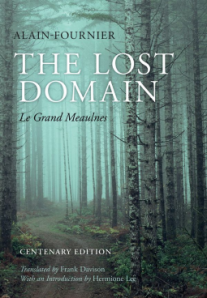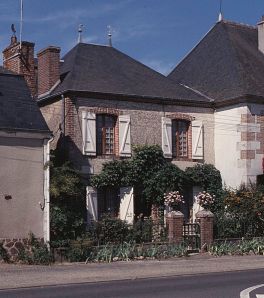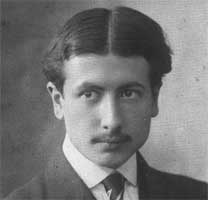Classics don’t feature too often on my list and when they do, I tend to be attracted towards the Russian and French classics, because they offer an element of the unknown and the unfamiliar. I like reading across cultures and am fortunate to live within a culture that provides me with learning opportunities every day, whether I read the literature or not. But reading it adds so much more to the experience and to interactions with local people.
I had come across references to Le Grand Meaulnes a few times and nearly brought it home with me after visiting West End Lane Books in London last October, leaving it behind on that occasion, but purchasing Brodeck’s Report, which I have since read and Alistair Grayling’s non-fiction work Friendship, of which I read a few pages and found it a little dense, not yet abandoned, but left for a rainy day.
Le Grand Meaulnes crossed my path again via NetGalley, where I learned of the centenary version below which coincides with the 100th anniversary of Fournier’s death. This version translated by Frank Davison, published by Oxford University Press.
I decided – enough – stop reading ABOUT the book and READ the book!
 And then what joy, to find myself in the company of Hermione Lee who has written such a wonderful introduction filling us in on Alain-Fournier’s life, that I could almost write an entire post on the gems she shares her excellent essay. She writes of the unique captivation this book has held over generations of readers and the literary qualities that have allowed it to continue to survive as a modern classic.
And then what joy, to find myself in the company of Hermione Lee who has written such a wonderful introduction filling us in on Alain-Fournier’s life, that I could almost write an entire post on the gems she shares her excellent essay. She writes of the unique captivation this book has held over generations of readers and the literary qualities that have allowed it to continue to survive as a modern classic.
“Alain-Fournier’s only novel maps an imaginary vision onto a real landscape. It is the story of his childhood, transformed into a romantic quest. It is set in real places which he had known all his life, with real names of villages and towns and shops and train stations, but it takes us on mysterious journeys to places that seem to belong to a fairy tale.” Hermione Lee.
The title itself and its translation present a dilemma, as it is not possible to translate all that it means in one expression, it is a play on words, for it is the nickname of one of the chief characters and a reference to an estate, a château that he will search for in vain.
For a man who died at 28, Alain-Fournier lead a full and dramatic life, making one wonder what more he may have accomplished had he not been killed tragically in 1914 shortly after being called up to fight in WWI. The drama continued after his death, as this one book that he wrote became a cult sensation and created a feud over his legacy, complicated further by the split between his parents, claims by his sister and her husband (Fournier’s best friend) and the married women Simone (whose husband he had ghost written a book for) whom he’d had an affair with, who aborted his unborn child.
One gets the impression having read Le Grand Meaulnes, that having addressed childhood, the author was just warming up for an entire litany of novels, drawing on the many experiences and emotions he had already encountered in such a short life.
“His longing for his childhood places and his desire to turn that emotion into writing was one of the fundamental impulses behind Le Grand Meaulnes.”
Beginning in the 1890’s, Le Grand Meaulnes is narrated by the quiet, unassuming Seurel, a boy whose life at the schoolhouse is relatively uneventful until Meaulnes, nicknamed Le Grand Meaulnes arrives and just as soon disappears, only to return again.
The arrival of Augustin Meaulnes at a small provincial secondary school sets in train a series of events that will have a profound effect on his life. Lost and alone, he stumbles upon an isolated house, mysterious revels, and a beautiful girl. Determined to find the house again, and the girl with whom he has fallen in love, Meaulnes is torn between his love and competing claims of loyalty and friendship.
It is a story of a childhood and adolescence told by one who observes, follows, understands and tries to assist, at the expense of living his own life to fulfilment. What happened to his friend in those few days he disappeared will obsess both boys thereafter, one because he wants to know what happened and the other because he wants to return there and cannot remember the way.
The books first pages are narrated when Seurel is five, the main story taking place when he is 15 and Meaulnes is 18 and will end when Seurel is almost 20. Whenever Meaulnes is present, there is an air of drama. Life and even his character take on a different aspect for Seurel when his friend is there, and when he is not, he mulls over what has passed and tries to make sense of it, and at times even do something about it.
“Meaulnes gone, I was no longer following in the footsteps of a visionary path-finder; I was once more a village lad like the rest of them – a status which demanded no effort and concurred with my own inclinations.”
It is a nostalgic read, somewhat melancholy, infused with an air of pending tragedy – and reminiscent of the life of the author. It creates an ambiance of short-lived joy and then loss, one that is repeated often. We don’t read for the destination, but for the journey and its distractions, for the differences between characters facing the same situations. In this, it is a microcosm of humanity on a small scale during one phase of life, youth.
It is symbolic, not just of the end of childhood and romantic notions, but the end of an era of narrative style, published at the same time as Proust’s Swann’s Way, hailed as something new and a sign of the way forward for French literature, part of the new modernist movement, whilst Le Grand Meaulnes represented the end of the romantic tradition.
Loved it.
Note: This book was an ARC (Advance Reader Copy) provided by the publisher via NetGalley.




It’s been many , many years since I read Le Grand Meaulnes – and I shall look out for this new translation. Al the same, however well translated it is. please do read it in its original language – so much in this book is just not translatable!
LikeLike
I am sure you will enjoy the introduction as well, it’s very readable and you are write, it is one to read in the original language, but good to know the story beforehand before being distracted by learning new vocabulary.
LikeLike
I have to confess that I’ve never read this despite a decade in bookselling. Often thought about it but new titles pushed it out of the way. From your description it sounds as if it’s to be savoured not rushed.
LikeLike
I am happy to have read it now and find it a fascinating life story as well. It may not be a war book as such, but it feels appropriate to be reading a book written by a war veteran, one so young when he does and so full of talent and enthusiasm. The alternative war read perhaps! Yes, it’s definitely to be savoured, and very readable considering the period it was written.
LikeLike
I haven’t read this for 40 years now. I remember though how it lingered long in my memory. And at that time of course I hadn’t had the opportunity of living in France: I think it’s more than time to revisit it. You’ve definitely sold me on the introduction, but perhaps I shall have to take Catterel’s words to heart too, and read it in the original French instead of taking my usual easy way out and opting for the transaltion.
LikeLike
I’m looking forward to reading more in French in the future, though I like to become familiar with the story first, it’s what I tell my students to do when watching a film, watch in your own language first so you know the story and then watch it again in the original language to try and understand the language. Not knowing the story and trying to understand the language can be very frustrating and they avoid doing it, whereas this way, they are more likely to actually enjoy the process.
Not sure if Herminone Lee’s introduction will be in any French edition, but 2014 is certainly to reread this classic, written by a young man on the cusp of a successful career who went off to war, ever to return. I like the idea of reading literature by a verteran of WW1 as an alternative to reading war stories themselves.
LikeLike
I read it when I was about 16-17 and was absolutely enthralled by it. But I didn’t know any of the author’s background so thank you for sharing it with us. A beautiful, wistful and very romantic book.
LikeLike
I can imagine this would have been amazing to read as a teenager and from what I have read, many who read it again many years later are not disappointed. It is a unique book, especially given it is his only work and so accomplished at that. I hope it attracts many readers in 2014, the 10th anniversary of his death.
LikeLike
I read this book when I was a student taking French – it remains to this day the only book I’ve ever read in French! But beyond the nostalgia I adored this book. I thought it was magical 30 years ago and found it every bit as magical when I re-read it last year. Really enjoyed your review and will look out for new edition – as mine is rather dog-eared to say the least!
LikeLike
I’m enjoying discovering all these wonderful readers who have read this in French. Rather than a feeling of accomplishment, I now feel I must reinhabit a teenage self and go get the French copy, I imagine they must be reissuing it as well in French? But that Herminone Lee introduction is quite an essay and shows him to have been quite a character himself. It will look goood on your shelf and is sure to get another outing. 🙂
LikeLike
How I wish we can have a bookstore like your West End Lane Books. Translation works are hard to find, even when they are classics. And thanks for intro. Alain Fournier, one of Proust’s contemporaries.
LikeLike
Saving your review ( just skimmed it) for a rainy day! I am eager to read this author and will try it in French. What a wonderful discovery via your blog ( as was Ru!) Your reviews of classics interest me the most…please keep them on your reading list 2014!
LikeLike
I’ve just downloaded the French version to my kindle to read. And I am planning on reading The Foundling Boy soon Le Jeune Homme Vert by Michel Déon, a modern classic (1975). Eugene Onegin has a smattering of French too 🙂
LikeLike
Everything is better with a smattering of French!
LikeLike
Another book that has been sitting on my shelves waiting for too long. Each time a blogger reviews it, I think I must read it soon – maybe this time.
LikeLike
It’s not a long book, neither is it a difficult read and it’s his 100th anniversary, now is definitely the year to read it. 🙂
LikeLike
Pingback: Eugene Onegin – Chapters Three & Four | Word by Word
Pingback: The People in the Photo – Eux sur la photo | Word by Word
Pingback: The Foundling Boy (Le jeune homme vert) | Word by Word
Beautiful review, Claire! I am so glad and happy that you enjoyed ‘Le Grand Meaulnes’. I loved it too. The theme of the book – the main character trying to find a magical place that he once visited and not being able to find the way – that tugged at my heartstrings. Sometimes we suddenly remember people whom we met and befriended and loved when we were children and with whom we have lost touch now. Or we remember a taste or a fragrance that we loved many years back. We suddenly yearn for those people or for that taste or that fragrance and search for them but we are not able to find them. I remember the tea we used to have at home when I was a child. We always used to have it without milk and it was the best tea I have ever had. I have since tried finding it again and in the process tried all kinds of tea, but that tea which I loved so much during my childhood seems to have disappeared without a trace. I sometimes think whether the taste I remember is mythical 🙂
I want to read this new translation just for the Hermione Lee introduction 🙂 Thanks for this beautiful review.
LikeLike